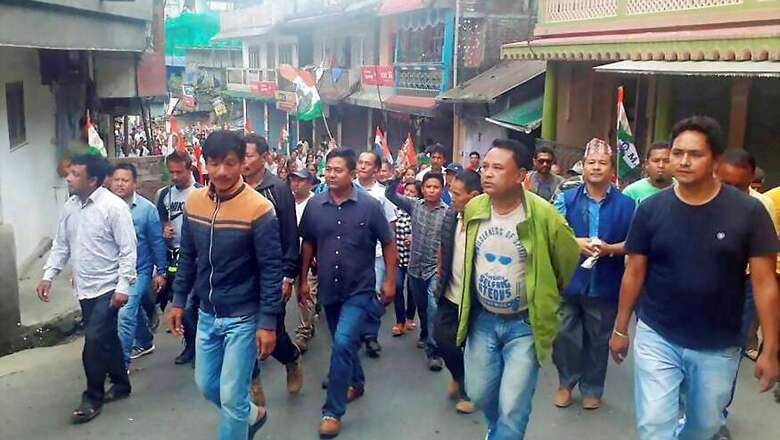
views
The people of Darjeeling hills, the aam janta, must withdraw the strike. I say aam janta because we all know that it is only they—nameless, faceless and leaderless, and yet the engine of the Gorkhaland agitation going on in the hills for over three months now—who can do so. It is they who have pressured political leaders into continuing with the strike, initially called by the politicians, refusing to let them withdraw without a positive outcome.
The strike in demand for a separate Gorkhaland state will complete 100 days on Friday. The common people are caught between the pro- and anti-strike factions of the Gorkha Janmukti Morcha, the party that has been spearheading the demand for a separate Gorkhaland state over the past decade.
While largely the shutdown is still in force, in some places people have started defying the bandh and shops and business establishments, and also schools, have reopened. Government employees are also trickling back to work. But that is not without fear. Shops are mostly doing their businesses with half their shutters down, ready to shut down should a pro-strike rally pass by. And even if some schools have reopened, parents are still afraid to send their children.
The agitation this time belonged to the masses and after owning it all this while it is slowly turning into a contest between Bimal Gurung, the Morcha chief in hiding who wants the strike to continue, and Binay Tamang, his lieutenant who has defied him and wants the strike to end. It will be most unfortunate for an agitation fuelled by people’s passions to end up as power struggle between two political opportunists.
In a situation like this, there is an acute need for the people to understand and decide for themselves as to what they want to do. The civil society—general masses, intellectuals and community leaders—who made the current agitation an impressive people’s movement, must come forward and take a call against continuing the strike. Here’s why:
1. People are suffering. They are not outsiders, but the hill people. Darjeeling is too far away from Delhi, or even Kolkata for that matter, for the suffering of its people to matter. Let’s face it. Continuing the strike will not, as many I know believe, be able to keep any sort of pressure on anyone—leaders, or the state or central governments. That is because the suffering is not theirs, but the people’s.
If it really could put any pressure on anyone, three months was a long time. Other than the “softened tone” of Chief Minister Mamata Banerjee, there’s little by way of achievement as far as drawing outside attention is concerned. Far from speaking up for the people, leaders of the Bharatiya Janata Party, Morcha’s ally, have on the contrary said they oppose Gorkhaland. The Centre and State have been conveniently playing passing the parcel.
2. It has outlived its usefulness. The strike has achieved what it had to. It has woken up, and stirred the passions of the people in the hills. It has exposed the inefficiency of the current crop of leaders. This is no mean feat. For the common people, who have so far been seen as subservient to the political class; who have survived the dictatorial regimes of Subhash Ghisingh and Gurung, standing up to their leaders and questioning them, and putting them under pressure, is of tremendous importance.
3. Continuing the strike will not create Gorkhaland. Not this time, at least.
4. For the sake of the children. One of the biggest mistakes of this strike was to not give any exemptions to educational institutions. It is a foolish thing to do. Schools and colleges should have been kept outside the purview of the strike and all measures should have been taken to help students commute to their institutions without any trouble or fear.
Many people I know have asked how it is a big deal. At the most, they stand to lose just a year, which is a “small price” to pay for Gorkhaland. No, it is not “a small price” and no, it is not about “just a year”. A loss of “just a year” has many long-term impacts on young minds; it’s a scar of a lifetime. This is too much to risk, and too big a price to pay. School students must be kept outside the purview of any sort of political movements. Just like you don’t stop eating during a strike, education cannot be made to stop. It is a continuous process.
A society is judged by how it treats its children and their education. Should their “sacrifice” be needed for a “greater cause”, it must be the last resort.
5. It is time to innovate; think of news ways to protest, and be heard. Time to ask tough questions to the parties in the hills, and to the BJP that had sweet-talked the people into believing that it supported Gorkhaland.
Calling off the strike does not mean accepting defeat. Neither does it mean that the strike was a total failure. A strike can achieve only so much. It is wrong to expect a general strike to provide all solutions. It is wrong to expect a general strike alone to create Gorkhaland.
And, it does not mean a victory for Tamang either. He may want to gloat, but the common people by now know how not to let politicians play the same old dirty games again, don’t they?
Economy is completely crippled, education is in a shambles. It is going to be a long road to recovery. It is time now to put all energies into that.
Anuradha Sharma is an independent journalist.


















Comments
0 comment